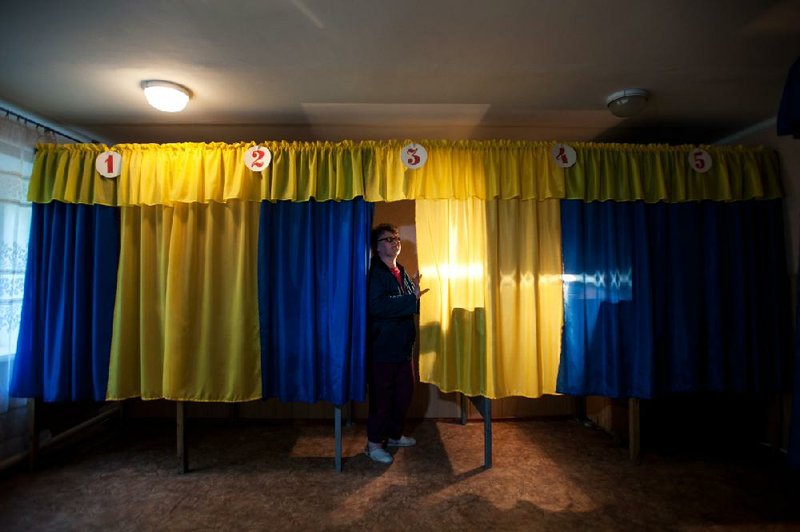DONETSK, Ukraine -- Separatist groups in eastern Ukraine are vowing to press ahead with referendums today intended to legitimize two self-declared new countries in Europe -- the people's republics of Donetsk and Luhansk -- even though officials in those places say they are not likely to be long-lived.
Those arranging the vote are in control of a patchwork of roads and public buildings in the two Ukrainian provinces.
The voting poses a risk of escalating the conflict in Ukraine by entrenching the political wings of pro-Russia militant groups while confronting the interim government in Kiev with the awkward task of arguing against the election or contesting its results.
"The results will legitimize us before the world community," Roman Lyagin, chairman of the central election committee of the self-declared Donetsk Republic, said Saturday.
Lyagin said he had printed 3.1 million ballots that pose one question: "Do you support self-determination for the People's Republic of Donetsk?" Lyagin said polling will take place at 1,527 sites secured by volunteers and police sympathetic to the cause.
Pro-Russia activists in the Luhansk region said they had made similar arrangements for a vote.
Voting started early Saturday at one school in Donetsk, for reasons that are unclear. After armed men threatened to kill a principal in the Luhansk region who did not want voting at her school, the central government said education officials should not take risks to oppose the polling.
The two provinces are predominantly Russian speaking, though polls indicate only about a third of the population supports annexation by Russia.
"We receive the right for self-determination," Lyagin said. "The next step will be another referendum when we ask, 'Do we want to join Russia? Or, do we want to join Ukraine? Or do we want to become an independent state?' There are many possibilities."
At a news conference Saturday, Lyagin again underscored the narrative of the pro-Russia groups that their movement is grass-roots and that, while embracing the Russian flag as a symbol, it is hardly beholden to Moscow.
The opinion of President Vladimir Putin of Russia, who on Wednesday asked the separatists in eastern Ukraine to delay their referendums, was less important than the opinions of residents, he said.
On Saturday, Germany and France pressed Putin to do more to calm the situation and to make the May 25 presidential election possible, with Chancellor Angela Merkel insisting that Putin must send "more signals of de-escalation."
Merkel described the referendums as "illegal," while French President Francois Hollande said they "carry no weight."
"There have been initial signs [of de-escalation efforts by Putin], but this must be strengthened so that the message gets through to eastern and southern parts of Ukraine that everyone wants fair and general presidential elections," Merkel said.
Merkel and Hollande called in a joint statement for a "national dialogue" between the Kiev government and representatives of all Ukrainian regions.
The pro-Russia groups have occupied administrative buildings in about a dozen towns, control some highways, and have full control over one midsize city, Slovyansk. Ahead of the referendum in Slovyansk, the town's self-appointed mayor, Vyachislav Ponomaryov, sounded a defiant note, assuring people that nothing would stop the vote and predicting turnout of "100 percent."
"We are completely ready for the referendum," he said at a news conference Saturday. "A territorial commission has been created. Necessary spaces, voting booths and ballot boxes have been prepared. All organizational questions have already been resolved. Some small nuances remain. But as these small questions arise, we will resolve them. The referendum will happen in any weather."
Lyagin said the separatists might struggle to conduct the vote in the southeastern city of Mariupol, in the Donetsk region. Ukraine's armed forces arrested many militants in the city Wednesday, and Lyagin said the rebels were coordinating the situation there "on the run" and would conduct the referendum "where it is possible."
Drunken mobs roamed the otherwise deserted city center of Mariupol on Saturday, a day after heavy fighting between pro-Russia militants and Ukrainian security forces left at least seven people dead.
In another sign of the collapsing morale of Ukraine's security forces, members of the national guard evacuated their barracks in the city Saturday morning. They left behind at least three armored personnel carriers and equipment, which were promptly looted, witnesses said.
In the city center, militants set fire to a broken-down infantry fighting vehicle that the army had been forced to abandon the previous day. But their failure to empty it of all its ammunition caused a series of explosions that led some of their comrades to set fire to their barricades, fearing another attack, a witness said.
Information for this article was contributed by Andrew E. Kramer and Noah Sneider of The New York Times; by Geir Moulson of The Associated Press; and by Simon Denyer and Fredrick Kunkle of The Washington Post.
A Section on 05/11/2014


